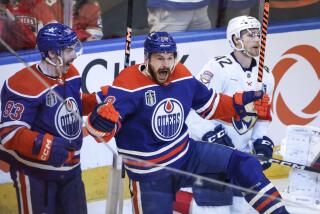It’s Not an Original Sin if Original Six Are Out of It
ST. PAUL, Minn. — Not quite 10 minutes after the Minnesota Wild had squeezed the last bit of air from the congested throats of the Vancouver Canucks on Thursday, two Canadian reporters declared the demise of hockey as we know it.
Having Minnesota and the Mighty Ducks in the Western Conference finals will be a disaster, they agreed. A 1-0 contest will be a high-scoring affair, and that goal probably won’t be scored until the third overtime, they said, shuddering at the prospect of two teams outside the NHL’s Original Six -- outside the Original 26, for that matter -- skating into sacred territory presumably reserved for franchises that have suffered longer.
One of the duo said no one would care about the conference finals outside Minnesota and Anaheim. The other responded by saying that not even people in Anaheim would care about the series, which begins here today.
For that pair -- and those who tune in to something else or tune out altogether -- it’s their loss, because the West finals will showcase a lot of good things about the game.
Neither of these teams is limited to mind-numbing defensive strategies. The Wild scored 16 goals in winning its last three games against the Canucks and has the top power play in the playoffs at 26.3% (15 for 57). Minnesota is averaging three goals a game, tops among the final four teams, and the Ducks are averaging 2.4. Combined, that’s more goals per game than teams averaged during the regular season.
“I really believe we’re a better team than people give us credit for,” Minnesota center Wes Walz said. “And they’re a better balanced team than people think. They’ve got four lines and don’t rely on one line for offense. Sometimes, those are the toughest teams to play.”
Find a tougher team to play than the Wild, which became the first team in NHL history to rally from a 3-1 series deficit twice in the same playoff season.
“We’ve gotten some bounces, but we’ve worked hard for our bounces,” Wild winger Richard Park said. “We’ve got a hard-working team and the last time I checked, hockey was a team game.”
Find a tougher team to play against than the Ducks, who are 4-0 in overtime and have eight one-goal victories this spring.
“We play the same styles,” Minnesota defenseman Willie Mitchell said. “They’re very well-coached and they play their system very well. Both teams have some very good scorers and both teams are very disciplined defensively. It should be a really good series.”
As for the horror of not having Colorado, Detroit or Dallas in the finals, what exactly is wrong with hearing fresh stories and seeing new faces and showcasing teams that, because of their inconvenient time zones and laugh-provoking names, have been underestimated all season? The NHL should be glad of a chance to begin promoting the next generation of stars, such as Marian Gaborik of the Wild and Stanislav Chistov of the Ducks. They don’t have the name recognition of Sergei Fedorov or Joe Sakic, but neither did Fedorov or Sakic 10 or 15 years ago.
Nowhere in the rule book does it say that the Boston Bruins, Chicago Blackhawks and New York Rangers are guaranteed anything because their charters were granted decades ago and their names are more familiar to casual fans. Is it bad for the NHL’s TV ratings to have the Rangers and Blackhawks miss the playoffs, and to lose the Red Wings and Avalanche early? Perhaps. But should the Ducks or the Wild have rolled over and died to allow their better-known foes to move on? Hardly.
The Blackhawks, Bruins and Rangers are models of mismanagement, examples of how to run great franchises into the ground. The Wild is an example of how to do everything right, how to become ingrained in the community, how to draft well and how to salvage players whose talents were ignored or misused by other teams. The Ducks, after some dark years, have turned around under Bryan Murray to become competitive and more cognizant of the need to connect with the community. They’ve also had some successful reclamation projects and found some gems in the draft. More power to them.
The Wild and Ducks earned their trips to the conference finals. The Wild never panicked after falling behind Colorado, 3-1, in its first-round series and never strayed from its game plan in the same situation against Vancouver.
“There have been some exceptional things happening in the first two rounds,” Mitchell said.
And some were the same, time-tested factors teams have relied on in the playoffs for years. The Wild and Ducks had better goaltending than their opponents in each round and were better at capitalizing on mistakes and turnovers. They’re relying on special teams and unexpected contributions from players who are learning how to thrive under pressure. They’re honoring the game, not subverting it or killing it.
More to Read
Go beyond the scoreboard
Get the latest on L.A.'s teams in the daily Sports Report newsletter.
You may occasionally receive promotional content from the Los Angeles Times.







